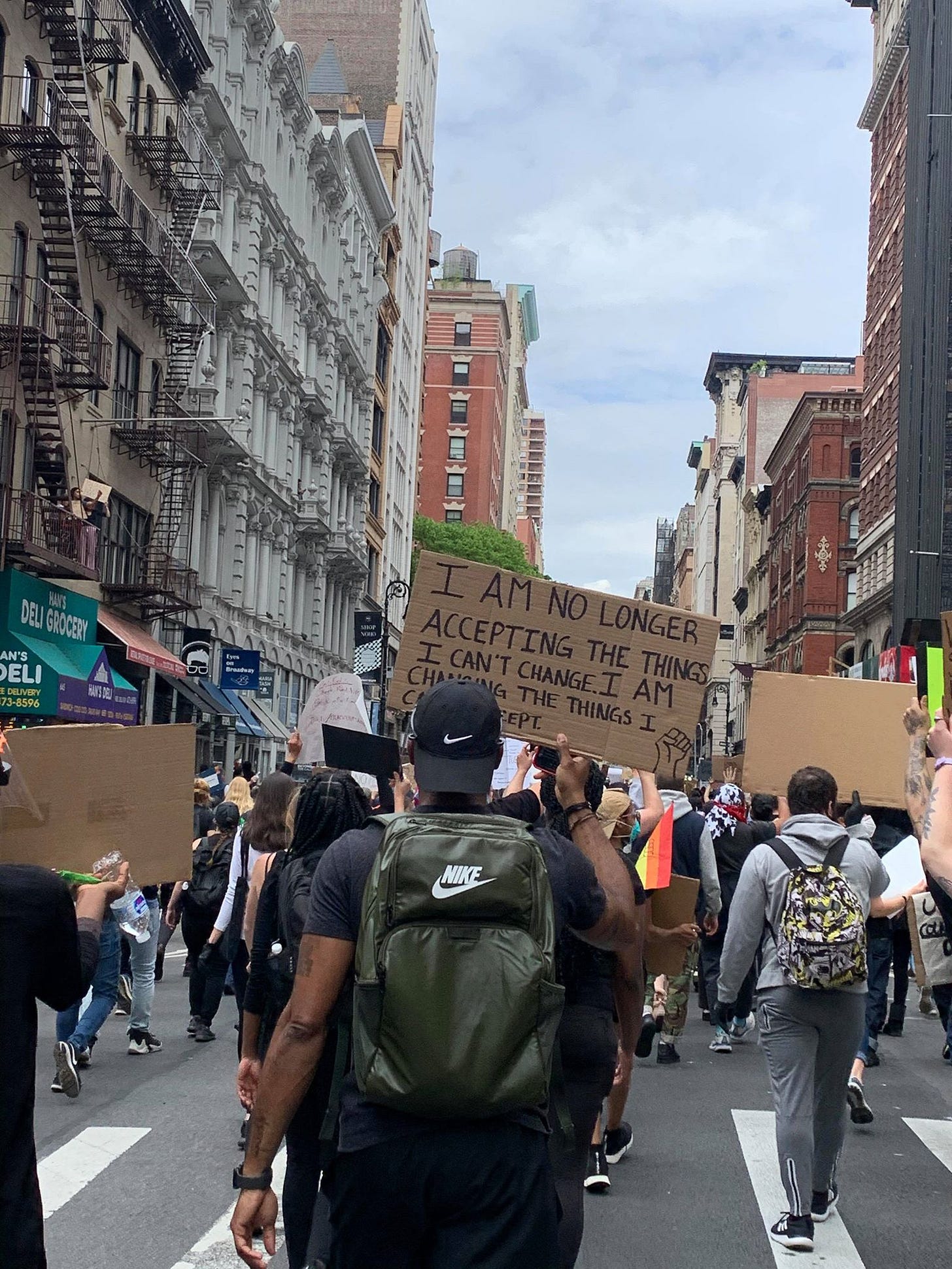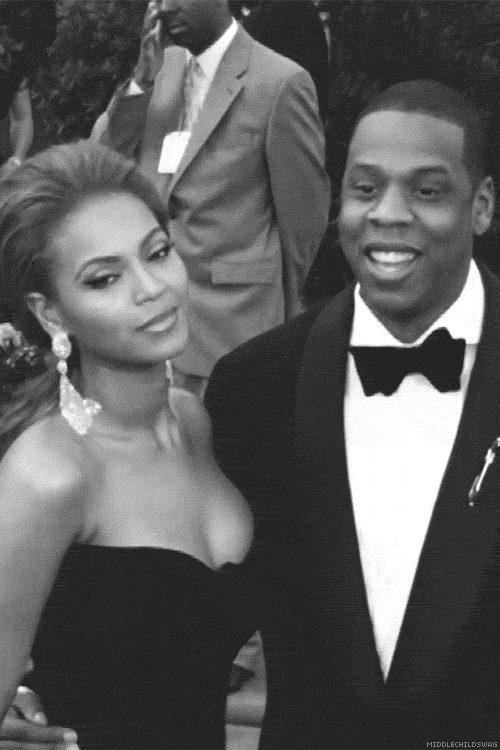Edition #27: Examining the Ugly Truths
Plus, what to watch, read, and listen to in the quest to self-educate, a case for rage, and a question about your stance on reparations

A Note From the Editor
I wanted this note to be uplifting and positive, echoing the sentiment I shared on Tuesday after marching 10 miles with my fellow New Yorkers: I wanted to use my experience to make you feel empowered to protest, to divorce the looting narrative from the peaceful gatherings happening all around the world. But as I spent more time reading, I realized a protest or a Facebook post or a black square on Instagram are fleeting actions. They're the effect, not the cause, and to change myself on any meaningful level, I'd need to identify my contributions to the cause.
I've been best friends with a girl named Jerusha since the 7th grade. We met at a tiny arts school in a class full of 30 girls, and I don't remember ever consciously recognizing she was black. Jerusha's family had money, mine did not. Her house was big and beautiful, mine was not, and perhaps it was this backdrop that allowed me to consistently level our experiences with one another. I never felt like she was better than me because of her nice things, but I also couldn't imagine that she understood struggle the way I did. With a perfect family and a peaceful home and a BMW, how could she?
In the 10th grade, we banded together and left arts school, dreaming of the football games and jockey boys-only public school could bring. In our new environment, Jerusha and I quickly fell into separate crowds-- me with the white kids, her with the black ones. This never impeded our friendship, but it did create more nuanced dynamics. When I tried to hang around Jerusha's friends I felt uncomfortable and unable to fit in (she never felt this way around my friends; she'd been around white people her whole life). I'd express frustration to my white friends, saying things like "she never used to talk like that or dress like that." I felt left behind, like she was capitalizing on a part of herself she'd kept hidden from me, one that I couldn't easily access. I felt like she was using her blackness to fit in, in an environment where blackness was celebrated. I never considered that this was a part of her that I had simply chosen to ignore and that maybe she didn't feel comfortable expressing herself in the same way around me because of it.
When we both moved to New York as adults many years later, she shared her frustrations with the lack of Black roles in theatre. She was working the audition circuit, and though she could flex for different casting calls because of her light skin tone, some of her friends weren't so lucky. I couldn't understand the argument-- didn't her friends want to earn their roles fair and square? If playwrights and screenwriters starting writing Black roles just for the sake of it, wouldn't being cast in those roles feel like nothing more than a consolation prize? I couldn't see what I see so clearly now; that it 's never been about true merit when your skin color precludes you from having an opportunity in the first place.
Jerusha recently shared a memory with me from way back at the start of our friendship, in the eighth grade. Her community operated a local trolley that we would often take to the downtown area during our sleepovers, to get Frapappuccinos or chase boys.
"We were boarding the trolley," she recounted, "and you got on first. When I tried to get on, the driver stopped me and asked to see my ID." The trolley was free for residents, paid for non-residents. "He just assumed you lived there and that I was the guest. And he never made you pay for the ride, either."
I wondered how she felt during that ride, whether she carried the weight of the incident with her throughout the day. I wonder whether, in some alternate universe, my 13-year-old self would've noticed as it was happening, slipping a crumpled dollar bill into the non-resident slot before taking a seat, resting her head on her best friends shoulder and saying, "What a prejudiced jerk, I'm sorry about that."
None of these are isolated incidents, and before these past few weeks, I don't know whether I'd have considered them incidents at all. They're uncomfortable to admit and to inspect, but lately they're bubbling up to the surface of my memory like bursts of lava. When three different African American authored novels were chosen for book club all in a row, and on the third, I thought, "another race book?" When a family member told a story about how a black woman got hired not for her skill, which he swore was lacking, but because the department "had to hire black people". How I felt disgusted but didn't call the racist comment out for what it was, figuring we would never agree. When I showed a boy I was dating a photo of my beautiful friend on the back end of a story about how someone stopped us on the street to comment on her beauty, and he remarked, "she's pretty, for a black girl."
I'm dedicating this edition to the stories and resources I found most helpful this week during my quest to self-educate on the history of injustice African Americans have faced since long before the tragic murders of George Floyd, Ahmaud Arbrey, Brionna Taylor and many others. This isn't a crash course, it's the start of a lifelong lesson, one that I wish I'd started paying attention to much sooner.
Cheers, my dears, and I'd love to hear about the pieces you've found most insightful this week, or about your experiences with race, inequality, and self-understanding.
Three Pieces of Content Worth Consuming:
Watch “13th” On Netflix. This documentary should be required watching for every student in America as it re-frames the white-washed history lessons we were taught in school (using nothing but factual instances and real legislation). It explores the criminalization of African Americans throughout US history and is the perfect place to start in understanding how we ended up where we are today. Watch the first, and then revisit the rest of the pieces linked in this edition a second time afterward.
A Defense For Looting, Burning and Rage. As our conversation has become dominated by looting-- the wrongness of it, the separation of "good protesters" from "bad looters," and this piece is both eloquent and important. Consider this: when white people in Michigan couldn't go outside because of a deadly virus, they showed up with guns-- and were met with no police force. Imagine how those protesters would've reacted if they saw a friend or family member get murdered by the police, especially if the police got away with it over and over again. Imagine how you would react, and try to deeply consider these truths before pass harsh judgment on expressions of rage, or before you agree with those who do.
Listen To This Podcast: A Tale of Two Schools. Two high school teachers in the Bronx create an exchange program for their students. Though their schools were only three miles apart, they were entirely different-- one among the poorest in the country, the other an elite private school (and you can probably guess the racial makeup of each school). Ten years after the exchange, a journalist tracks down the students from the poorer school to talk about the wildly varying ways in which the experience shaped their futures.
Perhaps You Should…
Consider Your Stance on Reparations
Because police reform and justice served are only small pieces of a much larger puzzle. If you can't give a clear answer without doing a Google search, start by reading up on H.R. 40, a bill that would create a commission to study the lingering effects of slavery to make recommendations for appropriate remedies. H.R. 40 has never made it to the House floor, despite the fact that late Congressman John Conyers Jr. brought it to every single legislative session from 1989-2017. Once justice is served for George Floyd and the social media bubble bursts, will you support a bill like H.R. 40? Will you openly discuss it, post about it, advocate for it? As the great Ta-Nehisi Coates says in his essay on the subject,
"To proudly claim the veteran and disown the slaveholder is patriotism à la carte."
Bonus Content (fueled by celebrity drama)

Need a little break from all the heaviness? Here it goes: you probably already know Jay-Z initially discovered Rihanna, signing her to Def Jam when she was only 16-years-old. You've heard the rumors, you've heard the explosive lyrics of "Lemonade" and seen the trolling of the alleged "Becky with the good hair" mistress, you've heard the rebuttal that doubles as a confessional in "4:44"-- but there's more to the story.
A Quote From A Book You Should Read:
“Our cities have constructed elaborate expressways and elevated skyways, and white Americans speed from suburb to inner city through vast pockets of black deprivation without ever getting a glimpse of the suffering and misery in their midst. But while so many white Americans are unaware of conditions inside the ghetto, there are very few ghetto dwellers who are unaware of the life outside. Their television sets bombard them day by day with the opulence of the larger society. From behind the ghetto walls they see glistening towers of glass and steel springing up almost overnight.”
-The Radical King by Dr. Martin Luther King Jr., Cornel West
This newsletter is best served with a side of conversation, so drop your opinions, reflections and thoughts in the comments below and let’s get to talking.
—or— Share the most thought-provoking piece from today’s edition with someone you love, then call them up and have a conversation about it. Because as a wise woman once said, “Great minds discuss ideas.”



